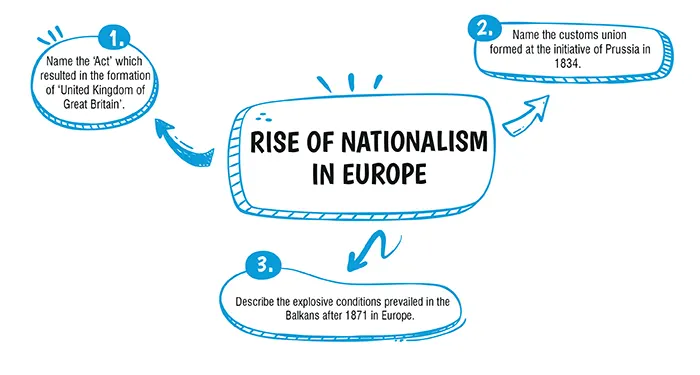Home / Boards / CBSE / Important Questions / Class 10 / Social Science / The Rise of Nationalism in Europe
Table of Contents

Ans. (b)
Explanation:
“When France sneezes, the rest of Europe catches a cold,” was said by Metternich, the Austrian chancellor. He believed that the political developments in France were intriguing for other European nations.
Ans. (b)
Explanation:
Victor Emanuel II.Victor Emmanuel II (1820-1878) First king (1861-1878) of united Italy and last king of Piedmont-Sardinia (1849-1861).
Explanation:
The Acts of Union, passed by the English and Scottish Parliaments in 1707, led to the creation of a united kingdom to be called “Great Britain” on 1 May of that year. The UK Parliament met for the first time in October 1707.
Explanation:
Zollverein, German customs union established in 1834 under Prussian leadership. It created a free-trade area throughout much of Germany and is often seen as an important step in German reunification.
Explanation:
Balkan region was a source of tension because of the following reasons:
(i) It was a region of geographical, ethnic variation comprising Romania, Bulgaria, etc., and its inhabitants were broadly known as Slavs.
(ii) Large part of Balkans was under the Ottoman Empire and the disintegration of which created an explosive situation. One by one its European subject nationalities broke away from its control and declared independence.
(iii) Balkan peoples based their claims for independence or political rights on nationality and used history to prove that they were independent but subsequently subjugated.
(iv) The Balkan states were fiercely jealous of each other & hoped to gain territory.
(v) Matters complicated because of intense rivalry among European powers over Trade & colonies as well as naval and military might.
Download Mind Map of this chapter
Download NowWant to Practice Mock Tests of this chapter
Practice NowDownload Important Questions of this chapter
Download Now| Chapter No. | Chapter Name |
|---|---|
| History | |
| Chapter 1 | The Rise of Nationalism in Europe |
| Chapter 2 | Nationalism in India |
| Chapter 3 | The Making of a Global World |
| Chapter 4 | The Age of Industrialization |
| Chapter 5 | Print Culture and the Modern World |
| Geography | |
| Chapter 6 | Resources and Development |
| Chapter 7 | Forest and Wildlife Resources |
| Chapter 8 | Water Resources |
| Chapter 9 | Agriculture |
| Chapter 10 | Minerals and Energy Resources |
| Chapter 11 | Manufacturing Industries |
| Political Science | |
| Chapter 12 | Power – sharing |
| Chapter 13 | Federalism |
| Chapter 14 | Gender, Religion and Caste |
| Chapter 15 | Political Parties |
| Chapter 16 | Outcomes of Democracy |
| Economics | |
| Chapter 17 | Development |
| Chapter 18 | Sectors of the Indian Economy |
| Chapter 19 | Money and Credit |
| Chapter 20 | Globalization and The Indian Economy |
| Chapter Wise Important Questions for CBSE Board Class 10 History |
|---|
| The Rise of Nationalism in Europe |
| Nationalism in India |
| The Making of a Global World |
| The Age of Industrialization |
| Print Culture and the Modern World |
CBSE Important Questions Class 10
ICSE Important Questions Class 10
CBSE Important Questions Class 10
ICSE Important Questions Class 10